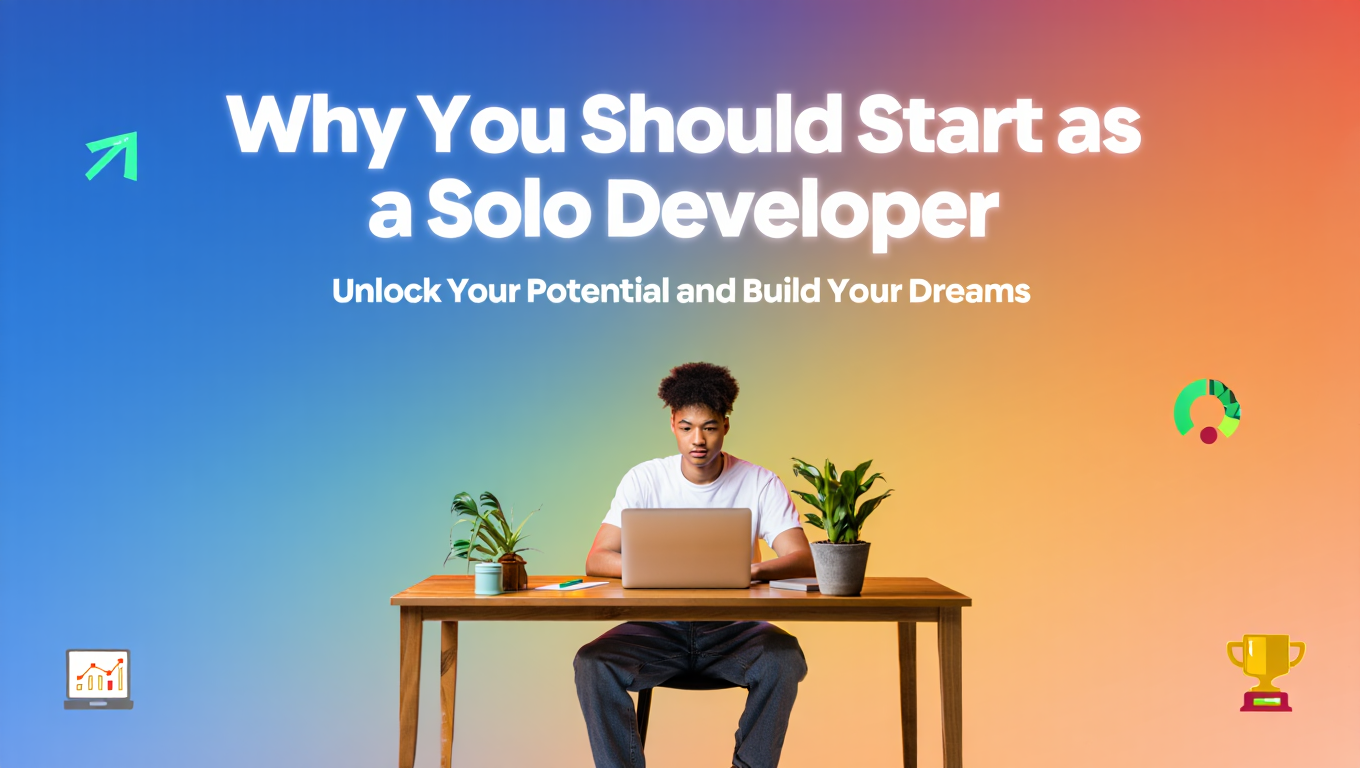Why You Should Start as a Solo Developer
The best time to start building alone was yesterday. The second best time is today. Here's why going solo might be the smartest move you'll make in 2025.

You're scrolling through LinkedIn at midnight, watching another team announce their Series A while you're stuck wondering if you should wait to find a cofounder before building anything real.
Here's what nobody tells you.. waiting for the perfect team is just procrastination with better branding.
I've been building products alone for years now, and I'm going to be direct about something.. starting as a solo developer isn't just viable in 2025 it's actually advantageous.
Let me show you why.
The Fear That's Keeping You Stuck
The standard advice sounds reasonable on paper.
"You need a technical cofounder." "You can't possibly handle frontend, backend, DevOps, and marketing alone." "Successful startups always have teams."
I believed this too.
Then I looked at the actual data from 2025 and realized everyone's been repeating outdated advice. Solo-founded AI startups grew from 17% in 2017 to 36% in 2024. Nearly 19% of early-stage AI startup funding in 2025 went to solo founders.
The game has fundamentally changed.
Billion-dollar one-person companies aren't fantasy anymore they're imminent. A solo founder in 2025 can orchestrate what once required entire teams. The infrastructure exists. The tools exist. The playbook exists.
What's missing is just your decision to start.
What Actually Happens When You Go Solo
I'm not going to romanticize this.
Building alone is hard. You wear every hat. You make every decision. You fix every bug at 2 AM because there's literally nobody else to call.
But here's what's also true..
You move impossibly fast.
When I built my last product, I went from idea to deployed MVP in 3 weeks. No meetings about meetings. No debates over architecture that don't matter yet. No waiting for someone else to finish their part before you can start yours.
You just build.
The speed advantage compounds. While teams are still arguing about which frontend framework to use, you've already shipped, gotten user feedback, and iterated twice. I've watched this play out over and over solo developers lapping teams because they have zero organizational overhead.
The Math Actually Works in Your Favor
Let's talk numbers.
Multiple indie hackers are generating over $1M in annual revenue while operating completely solo. One developer I researched went from zero to $45k/month in 2 years. Testimonial.to generates $800k/year. PDF.ai brings in $500k/year. Sidekiq became a $7M/year solo SaaS.
Are these outliers? Sure.
But about 5.72% of indie products generate monthly revenue exceeding $100k/year. That means roughly 1 in 17 solo developers who actually ship something hits six figures annually.
Compare that to startup failure rates and VC-backed company outcomes, and suddenly going solo doesn't look risky it looks strategic.
The best part? You keep everything.
No equity splits. No board to answer to. No cofounder disagreements that kill the company. When I make $10k from a product, I make $10k. Not $5k after splitting with a cofounder. Not $2k after dilution from investors.
The math is straightforward smaller revenue goes further when you're not dividing it.
What Makes 2025 Different
I need to be honest about why timing matters.
Five years ago, building solo meant doing everything manually. Today, 85% of developers regularly use AI tools for coding and development. 62% rely on at least one AI coding assistant. Nearly nine out of ten developers save at least an hour every week, and one in five saves eight hours or more through AI tools.
I use GitHub Copilot and it handles the boilerplate I used to spend hours writing. Cursor helps me debug in minutes instead of days. Claude helps me write documentation and plan features while I'm context-switching between frontend and backend work.
Here's the critical insight everyone misses.. AI doesn't replace you it multiplies you.
I'm still making every architectural decision. I'm still solving the hard problems. But the repetitive stuff that used to consume 40% of my development time? Automated.
The infrastructure got better too.
Vercel deploys my frontend in 90 seconds. Railway handles my backend without touching AWS IAM roles. Supabase gives me a database with auth and realtime features built in. I spend zero time on DevOps because platforms like these made it irrelevant for solo developers.
Cloud platforms democratized what used to require entire teams you can now deploy globally-distributed applications without understanding Kubernetes, and that's a fundamental shift.
The Skills You Actually Need
People overthink this.
You don't need to be a 10x developer. You don't need a CS degree. You don't even need to know every framework.
What you do need..
The ability to ship incomplete things.
That's it. That's the whole game.
I've seen brilliant developers who can't launch because their code isn't "perfect" yet. Meanwhile, indie hackers with messier codebases are making $20k/month because they shipped something users actually wanted.
You learn the rest while building.
I didn't know how to deploy Django with Docker when I started. I didn't understand caching strategies. I had no idea how to handle 10,000 concurrent users. But I also didn't need to know those things on day one.
I learned them when they became problems worth solving not before.
Your first version can be embarrassingly simple. Mine was. Every successful solo developer I've researched? Theirs was too.
The Real Advantages Nobody Talks About
Here's what surprised me most about working alone..
You develop better judgment.
When you're on a team, you can hide behind consensus. "We decided" to use microservices. "The team thought" we should rebuild everything in Rust. Collective decisions feel safer even when they're wrong.
Solo? Every choice is yours. Every mistake is yours. Every success is yours.
This forces you to develop real technical intuition. I stopped cargo-culting "best practices" from blog posts and started making decisions based on what actually solved my problems. That skill knowing what matters vs. what's just noise becomes your competitive advantage.
You build exactly what you want.
No compromises. No design-by-committee features that please nobody. When I see a product need, I can validate it and ship a solution in days. Not weeks of convincing stakeholders. Not months of roadmap debates.
Your time management gets ruthlessly efficient.
I learned which tasks actually move the needle and which ones are just busywork pretending to be productive. Marketing? Matters. Documentation? Matters. Refactoring code that already works? Usually doesn't matter yet.
Teams often confuse activity with progress solo developers can't afford that luxury.
How to Actually Start
Stop waiting for permission.
That's the whole secret. There's no committee that decides you're ready. There's no certification that qualifies you. You just start building.
Pick something small enough to finish in two weeks. Not a revolutionary platform. Not a comprehensive solution. A tiny tool that solves one specific problem.
I'm serious about two weeks. If you can't ship it in 14 days, the scope is too big. Cut features until it's embarrassingly simple, then build that.
Choose boring technology. This isn't the time to learn three new frameworks. Use what you already know. JavaScript? Build with JavaScript. Python? Build with Python. The tech stack doesn't matter shipping matters.
I've watched developers spend six months building the "perfect tech stack" without launching anything. Meanwhile, someone else shipped a Django monolith in three weeks and found 1,000 paying users.
Talk to users before you build.
Find five people who have the problem you're solving. Ask them how they currently handle it. Ask what they'd pay to fix it. If you can't find five people who care, you're building the wrong thing.
This step saved me from wasting months on products nobody wanted skip it at your own risk.
What You Should Do Next
Here's what actually matters..
- Speed beats perfection ship something ugly that works instead of building something perfect that never launches
- AI tools are force multipliers learn GitHub Copilot, Cursor, or Claude to automate the boring parts
- Your bottleneck is decision-making not coding skill, not resources, just your willingness to commit and ship
Start here..
This week, build the smallest possible version of something you wish existed. Don't plan it. Don't design it. Don't research frameworks for three days.
Just open your editor and start coding.
Set a deadline of 7 days from right now. When that deadline hits, deploy whatever you have. It'll be incomplete. It'll be rough. It'll be exactly what you need to learn whether this idea has legs.
The difference between developers who succeed solo and those who stay stuck isn't talent or connections or funding.
It's just that one group ships things and the other group plans to ship things.
You already know which group you want to be in.
Now prove it.
